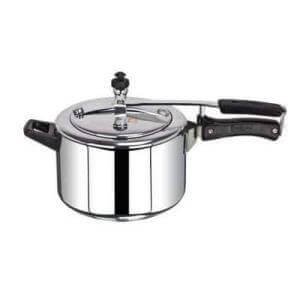Understanding the limitations of aluminum pressure cookers
Aluminum pressure cookers are affordable and lightweight but have limitations. They are not as durable as stainless steel pressure cookers and may dent or deform easily. Aluminum is also a reactive metal, which means it can react with acidic ingredients and cause discoloration or a metallic taste in the food. Additionally, aluminum pressure cookers may not be compatible with induction cooktops. It is important to understand these limitations before purchasing an aluminum pressure cooker.
Try our pressure cooker selector to choose right pressure cooker by answering simple questions without reading any buying guide.
Understanding the Limitations of Aluminum Pressure Cookers
Pressure cookers have become an essential kitchen appliance in most Indian households. They are used to cook food faster and save time and energy. However, not all pressure cookers are created equal. Aluminum pressure cookers, in particular, have their limitations and drawbacks that users must be aware of.
What are Aluminum Pressure Cookers?
Aluminum pressure cookers are made of aluminum, a lightweight and affordable metal. They are popular in India because of their low cost and widespread availability. They work by trapping steam inside the pot, which increases the pressure and temperature, cooking food faster than conventional cooking methods.
Limitations of Aluminum Pressure Cookers
Not Suitable for High Acidic Foods
Aluminum is a reactive metal, which means it can react with acidic foods such as tomatoes, lemon, and vinegar. This reaction can cause the metal to leach into the food, which can be harmful to health. It can also change the color, taste, and texture of the food.
Not Durable
Aluminum pressure cookers are not as durable as other materials such as stainless steel or cast iron. They are prone to dents, scratches, and warping, which can affect their performance and safety. Over time, the aluminum can also corrode and develop pits, which can harbor bacteria and make the pot unsafe for cooking.
Not Induction Compatible
Aluminum is not a magnetic material, which means it is not compatible with induction cooktops. If you have an induction stove, you will need a separate pressure cooker that is compatible with it. This can be inconvenient and add to the cost of buying a new pressure cooker.
Not Suitable for High-Pressure Cooking
Aluminum pressure cookers are not suitable for high-pressure cooking, such as canning or sterilizing. They are not strong enough to withstand the pressure and temperature required for these tasks and can be dangerous to use. If you need a pressure cooker for canning or sterilizing, you should choose a stainless steel or cast iron model.
Conclusion
Aluminum pressure cookers have their limitations and drawbacks that users must be aware of. They are not suitable for high-acidic foods, not durable, not induction compatible, and not suitable for high-pressure cooking. If you are in the market for a new pressure cooker, you should consider these limitations and choose a model that suits your needs and preferences.
| Limitations | Aluminum Pressure Cookers | Stainless Steel Pressure Cookers | Cast Iron Pressure Cookers |
|---|---|---|---|
| Reactivity with acidic foods | Yes | No | No |
| Durability | No | Yes | Yes |
| Induction compatibility | No | Yes | No |
| Suitable for high-pressure cooking | No | Yes | Yes |
| By www.zelect.in | |||

Our smart selection tool guides you to the perfect and effortless purchase every time.
Facebook Twitter Email
Recommended articles for Pressure Cooker
Pressure Cooker types and buying guide
-
Pressure cooker buying guide 2024, India.
-
Is stainless steel pressure cooker good for health
-
Anodized pressure cookers and their non-reactive cooking surface
-
Anodized pressure cookers: Retaining flavors and enhancing taste
-
Anodized pressure cookers: PFOA-free and non-toxic cooking surface
-
Is anodized pressure cooker good for health?
-
Anodized pressure cooker disadvantages
-
Anodized pressure cookers: Benefits and features
-
Stainless steel pressure cookers and their versatility for different cooking styles
-
Stainless steel pressure cookers and their compatibility with induction cooktops
-
Stainless steel pressure cookers and their corrosion resistance properties
-
Exploring the durability of stainless steel pressure cookers
-
Aluminum vs. stainless steel vs. anodized pressure cookers: A detailed comparison
-
Stainless steel pressure cookers: A comprehensive guide
-
Understanding the limitations of aluminum pressure cookers
-
Understanding the safety aspects of aluminum pressure cookers
-
Aluminum pressure cookers: Lightweight and fast heating
-
Aluminum pressure cookers and health concerns: What you need to know
-
Aluminium pressure cooker side effects
-
Are aluminium pressure cooker bad for you
-
Which pressure cooker material is good for health? Aluminum or Stainless Steel or Anodized
-
Pressure cooker for baby food india
-
Why pressure cooker blast?
-
Pressure cooker for induction cooktop

